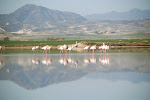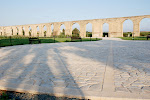Tuesday, November 4, 2008
Larnaka Salt Lake
The first site of immense interest encountered upon arrival at the Larnaka international airport is the Larnaka salt lake. Its past as a natural habitat of sea life is traced 3 million years BC and fossil life of that age can be found in the surrounding hills. The central salt lake in prehistoric times was a gulf. From 1700 BC was a secure natural port in the service of the large prehistoric town next to Hala Sultan Tekke, which was abandoned by its population at about 1050 BC, at about the time the gulf was closed, the natural port was destroyed and the central salt lake was formed. As excavations in the area show, this is perhaps one of the first natural ports of Cyprus that facilitated trade between Cyprus and the great civilizations of the area at the birth of international seafaring exchanges. The porphyra - red dies using the juices of the murex-shells, which were in abundance in the gulf and until now in the Larnaka bay, was one of the important and expensive exports of this prehistoric town and of Kition, the nearby town that succeeded. Salt was another expensive prehistoric product of the lake, which was extremely exploited through the centuries till a few years ago. Historians of Hellenistic, Roman, Frankish and Ottoman times report the great quality of this salt and its great income due to the exports. But, the most interesting thing about the salt lake today is the migration of birds in winter. These bird migrations include flamingos, ducks, swans and tens of other flying species. Such a rich hunting place did not escape the attention of the ancient, who had at the shores of the salt lake one of the most famous temples of Atremis- paralia (Diana of the seafront) goddess of hunt. Hunting is no more allowed, but watching the birds, walking the interesting surroundings and enjoying the famous red sunsets of the spot are strongly recommended. In the wider salt lake area covering about 5 square kilometers there are actually 4 lakes of exceptional natural habitat looked after by the Committee for the Protection of the Larnaka Salt Lakes, which is authorized under a relative Cyprus Law.
Subscribe to:
Post Comments (Atom)








No comments:
Post a Comment